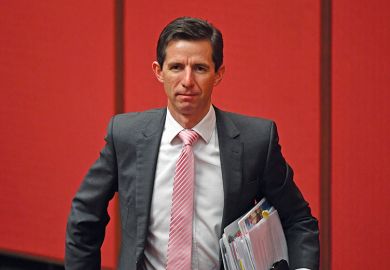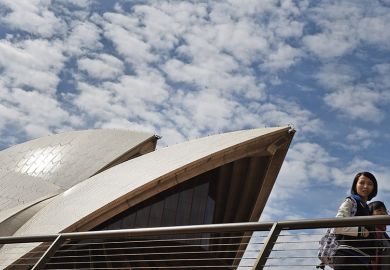As Theresa May launches a review in England of what she has acknowledged is “one of the most expensive systems of university tuition in the world”, and New Zealand scraps tuition fees altogether, Ian Jacobs is prepared to settle for what he sees as a happy medium.
“I’m glad to be in a system where there is balance between the public and private burden of student tuition fees,” said Professor Jacobs, vice-chancellor of the University of New South Wales, and now the chair of Australia’s Group of Eight coalition of research-intensive universities.
UK-born and a former vice-president of the University of Manchester, he has watched with interest as Jeremy Corbyn’s pledge to abolish fees reshapes the debate on higher education funding in England while, across the Tasman Sea from Sydney, Jacinda Ardern is putting a similar promise into action.
But Professor Jacobs is pleased to be in a country where there is widespread consensus about the merits of sharing the costs of higher education, for now at least.
“In Australia, about 60 per cent of the burden falls on the state and about 40 per cent on the student,” he said. “Whether the right balance is 60:40 or 50:50, I don’t know – but something like that seems a good reflection of the personal and public benefit of a university education.”
This is not to say that funding will not be a major priority – and a significant headache – for Professor Jacobs in his Go8 role.
The month before his appointment in January, the Australian government imposed a funding freeze on undergraduate courses that leaves universities A$2.2 billion (£1.3 billion) poorer over four years. This in effect marks an end to Australia’s system of demand-driven admissions, given that universities looking to expand or even maintain student numbers now face a cut in real-terms funding.
Professor Jacobs acknowledged the scale of the challenge, describing his role as “a big responsibility at a time of real concern for the sector”.
“As in the UK,” he continued, “there are questions being asked about the role of universities – about how well they provide education and how efficient or inefficient they are.
“My overarching aim, as chair of the Go8, will be to try to raise the quality of the debate and discussion nationally about what Australia wants from its universities, and about what they can provide, and to really explain the value of universities and the impact they can have both culturally and economically.”
The Australian government’s funding freeze was prompted by concerns that the demand-driven system had left the government without control over the size of its contribution to the sector. Part of the problem, according to Professor Jacobs, is the way in which higher education is perceived as a “fiscal cost”.
“The truth is the opposite: higher education is an enormous economic driver,” he said. “The return from investing in research is many multiples of the money invested. The benefits economically of a well-trained graduate workforce are enormous, and there are also enormous economic benefits from international education – not to mention all the other benefits that flow.”
The economic benefit of Australia’s international education sector – estimated at A$29.4 billion a year by the Australian Bureau of Statistics – is undeniable. A third of the total number of international students come from China, but this revenue stream seems increasingly endangered, with Beijing having issued a safety warning to Chinese students in Australia last month, motivated in part, it seems, by anger over new laws issued by Canberra aimed at limiting foreign influence.
There’s no reason to panic, according to Professor Jacobs, who highlights that students from China have “extraordinarily high satisfaction rates”, particularly, he said, in Go8 universities.
Meanwhile, as the higher education sector grapples with funding, another financial issue has come under the microscope.
As the debate on vice-chancellors’ pay rumbles on in the UK, Australians have started asking questions about their own university leaders, who are among the highest paid in the world.
In 2016, 12 Australian vice-chancellors – including Professor Jacobs himself – were paid more than A$1 million.
How would Professor Jacobs respond to public concern about executive remuneration?
“I would just say that the setting of vice-chancellors’ pay quite rightly sits with the governance structure that they report to – the council or the senate of the university – and that’s the way it should be,” Professor Jacobs said. “And if there are any discussions about performance or over-pay or under-pay, then that’s the right setting for it. It’s not a topic for vice-chancellors to decide for themselves.”
POSTSCRIPT:
Print headline: Let’s talk about the good universities do
Register to continue
Why register?
- Registration is free and only takes a moment
- Once registered, you can read 3 articles a month
- Sign up for our newsletter
Subscribe
Or subscribe for unlimited access to:
- Unlimited access to news, views, insights & reviews
- Digital editions
- Digital access to THE’s university and college rankings analysis
Already registered or a current subscriber?










